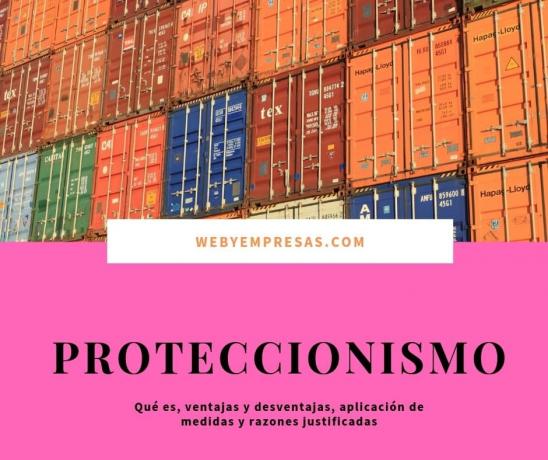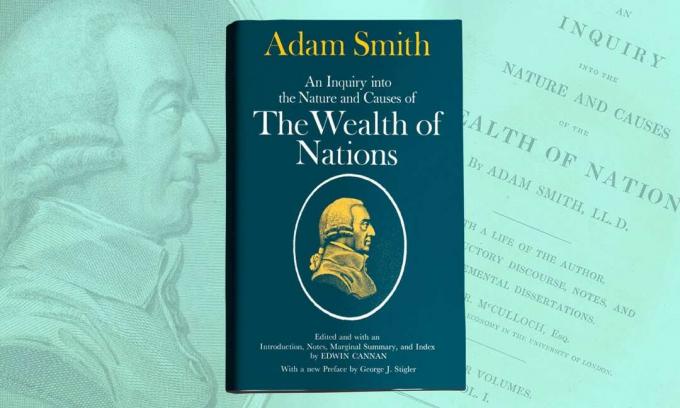It is known as protectionism to the economic policy that limit imports from other countries through different methods called tariffs on imported goods, a variety of government regulations and import quotas, which allow the value of goods to be increased in a way that does not be profitable.
Those who defend this policy affirm that this method protects companies, producers and workers in the sector that remains in competition with imports within the competing state Foreign.
Advertisements
Despite this, it can reduce trade and negatively affect consumers due to the increase in the prices of products and services. In addition, they also affect producers and workers who are in the export sector of the countries that practice the policy. protectionist, as well as those who are protected.

Advertisements
In this article you will find:
Most used protectionism measures
To carry out this type of police there is a wide variety of measures, among them are:
Duty
When a customs tariff or tariff is imposed, it refers to the tax of the economic authorities or of the government that is required of all imported products in order to reduce said products above the nationals. This will help to increase the sales value within the national market and allows internal products that are the same, to have a greater advantage in their prices.
Advertisements
Quotas or quotas
It is a way imposed by the state to hinder the importation of some foreign products, limiting the amount of import of them.
Export subsidies
It is a type of subsidy that helps national manufacturers of some products that they want to protect so that they can be exported at low and competitive prices.
Advertisements
Balance of payments
It refers to the accounting record of economic activities while the time of the state's operations with other countries passes during its development.
Appreciation
It is when the currency appreciates above another, for this to happen the exchange rate has to be reduced, in order to give hands to euros if you want to get a dollar.
Advertisements
Depreciation
If one currency depreciates against another, the exchange rate must be raised, so the amount of euros must be increased for each dollar that you want to have.
What are the most important advantages of protectionism
Among the most important advantages are:
- This policy protects the new national industries, since without this type of help they could not be able to develop adequately in their operations, due to the high costs. This type of protection is applied until the industry achieves its stability so that it can be a competition against foreign markets.
- National industrialization increases so that the national employment index increases once national production increases.
- Protects strategic industries for the state, it may happen that a country wants to specialize in one type of industry in case of that he thinks it can be a favorable strategy for the nation and that is why he will seek a way to apply this policy to protect her.
Protectionism also has great disadvantages
Within this policy there are some disadvantages such as those that will be mentioned below:
- The excessive increase in prices can limit the entry of imported products, in this case the industries nationals could take advantage of this to fully capture the market and apply the augmentation of their products in a excessive.
- Poor quality products can be generated by promoting the consumption of national products, this allows consumers to acquire products of the worst quality and even with a higher price than those that could be offered if this type of politics.
- Lack of competition can weaken the industry, this is because local companies often stop innovating and improve the quality of their products, allowing consumers to pay more for products of poor quality.
Application of protectionist measures of supporters and not so much.
When applying measures with this type of policy in a country, consumers generally lose by having to pay a higher price than that possibly offered by foreign competitors as long as there are no impediments in their products.
Foreign manufacturers may also lose out, due to their imposed limitations, which prevents them from being able to color their products in the protected market.
On the other hand, domestic manufacturers win, this is because their industries are protected from foreign competition that can take away a large part of their market share.
In the first instance in the state it is also favored, since the tariff is a tax that collects what goes directly to the public coffers.
Reasons justifying protectionism
Generally foreign trade relations promote free competition between countries, which is a great benefit for those involved. However, sometimes this policy can be justified for the following reasons:
Industrial protection that is considered as a strategy for the public interest
Some countries may conclude that some national industries may be strategic for the public interest.
Emerging industrial development
The advance of technological innovation, production and the incorporation of the economy of scale are factors that can overload the competition for the development of some new sectors. Because of this, countries can see in these policies the only way to protect these organizations that are beginning to develop.
Promotion of industrialization and job creation
When a state develops its own national industry in order to create jobs, it has the opportunity to change products international by nationals, in this way, the internal income of the country could be increased through business profits and salaries of the employees.
Economic collection
It is a strategy that underdeveloped countries frequently use a lot, since through the incorporation of customs, can increase significant income generated by companies importers.


